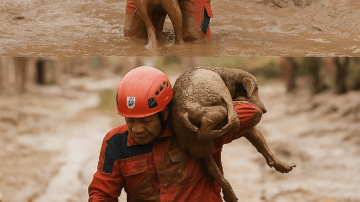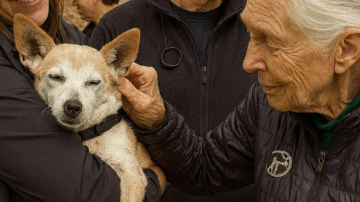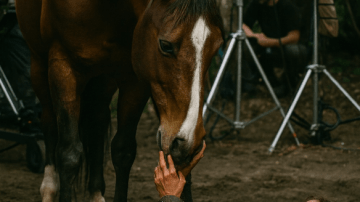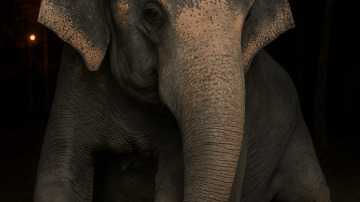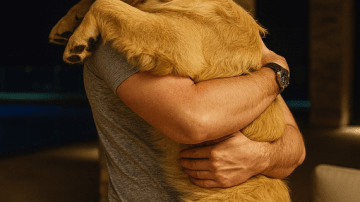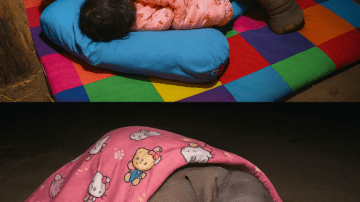Last night, I saw a post. Just another picture on a feed—except it wasn’t just another picture.

It was a puppy. Skin and bones. Abandoned. A soul left behind in the cruelest way.
What hurt the most wasn’t just the sight of him—it was the silence around him. The world had scrolled past. His suffering had become invisible. His cries, ignored.
I couldn’t ignore it. Not this time. At 3 a.m., I drove out into the night, because sometimes the difference between life and death is measured in hours.
And there he was. Still waiting. Still holding on, as if silently begging for one last chance.
He wagged his tail weakly when he saw me, though he was far too weak to stand. Around him was filth and garbage—the only shelter he had known. A graveyard of scraps had become his home.
His condition needed no words. The image alone broke my heart.

But that night was the turning point. That night, everything began to change.
We named him Dobby. Like the elf—small, loyal, fragile, but free at last.
At dawn, I rushed him to the vet. The news was grim: his body was crawling with fleas, mange, and infections. His skin was raw, itching, burning. He weighed only 14 pounds—a skeleton with a heartbeat. His gums were pale from weakness, though thankfully, no transfusion was needed.
Tests confirmed he had haemobartonella, a parasite that destroys red blood cells. His tiny body was already exhausted, and now it was under siege from within.
Still, Dobby never once complained. Not once.
We started treatment immediately: Simparica for his skin, antibiotics for infection, blood tests to track his recovery. Then came the moment that broke me—his first bath.

Perhaps the first bath of his life.
He trembled in fear, unsure of what was happening, but we lathered him gently with medicated shampoo, washing away years of neglect. The stench of suffering gave way to the simple, clean scent of care.
Dobby’s skin slowly began to heal. The itching subsided, and soon, patches of fur would grow again. His paw, injured long ago and worsened by malnutrition, still lifted painfully when he walked. But he walked. And with every step, he fought his way back to life.
We had rescued him just in time. Days later, he might not have been here at all.
At home, he discovered something new: comfort. He curled into his bed as if it were heaven itself. For a dog who had known nothing but cold and hunger, a soft blanket was a miracle.

Every small thing was magic to him.
At night, I found him curled beside Amapola, another rescue. He acted like a little gentleman—and a mischievous rogue at the same time. The way he looked at me when I interrupted their sleep, as if to say, “How dare you?”—it made me laugh.
Dobby was healing, not just in body, but in spirit.
We joked that he was “transforming.” And it was true. His soul began to smile. Little by little, the weight of pain lifted. Little by little, he became whole again.
He followed me everywhere, like a tiny shadow. If I stopped petting him, he nudged me insistently until I continued. He was clingy, yes, but only because he had finally found something he was terrified to lose: love.
Soon, he joined us at mateadas—gatherings for dog lovers. There, Dobby was a star. He wore his biggest grin, soaked in every cuddle, and leaned into every hug. People were drawn to him, and he, to them.
But as much as we loved him, we knew he needed more. He needed a forever home. And not just any home—something special.
After all he had suffered, he couldn’t settle for less than true love. He needed a family that was kind, committed, and responsible.
And then, it happened.
We found them. His forever.
A couple with hearts as wide as his own. They already had a three-legged dog—a sign that they understood resilience, difference, and unconditional love.
The moment Dobby stepped into their home, he was at peace. He adapted in a single day, as though he had always belonged there.
Letting him go shattered me. My heart ached at the thought of not having him by my side. But love means choosing what’s best, even when it hurts. His adoption opened space for another soul waiting to be saved. That is the rescue cycle—love, let go, rescue again.
Seeing him now, smiling, happy, loved—it makes every tear worth it.
Dobby has transformed. From forgotten to cherished. From broken to whole. From nearly dead to dreaming.
Today, he has everything he once longed for—walks, kisses, beach days, cuddles. A life abundant with love.
But Dobby’s story is not just his own. There are thousands more like him. Waiting. Suffering. Dying.
And all it takes is one person to notice. One person to act.
We cannot change their past. But we can change their future.
Dobby is proof of that.

